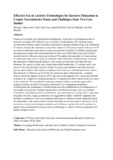| dc.description.abstract | County governments face innumerable impediments in the process of implementation of inclusive education (IE). Effective use of Assistive Technologies (AT) can help county governments in Kenya achieve inclusive education by helping children living with disabilities in schools. Despite the importance and positive impact of AT, prior research on the use of AT in inclusive education especially in county governments is limited. To fill this research gap, this paper investigates the research question of, How can AT be effectively used for IE in special schools in Kenyan county governments? To address this question, we conducted an in-depth case study of two county governments, Meru and Isiolo, and thoroughly reviewed the potential of establishing IE projects in the county governments and other relevant literature. Six special schools were visited where their headteacher, 12 teachers and 6 care givers of the special schools selected in the two county governments were interviewed in person, and by phone. The analysis of findings from interviews and literature review shows that obstacles to effective use of AT for IE come from three different levels – national, school, and social support. Because AT is only part of the equation for a county government to achieve IE, a high-level national perspective is required and other related factors also need to be considered. We recommend county governments adopt a systematic approach in tackling obstacles at each level and pay attention to five management challenges: establishment and maintenance of professional networks: identification and maintenance of knowledge and expertise; funding management; coordination among county government committees, and implementation, maintenance, and monitoring of a county special education programs. Overall, county governments are suggested to adopt a “network” approach that includes a constructive view of development drawing on incentives-based cooperation from all stakeholders. The results of this research shed light on the status quo of the use of AT for inclusive education in developing countries such as Kenya, and provide useful guidance to parties who are interested in using assistive technologies to achieve inclusive education, for global competitiveness. | en_US |

